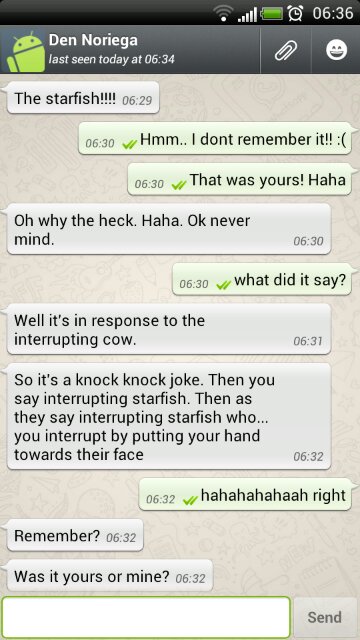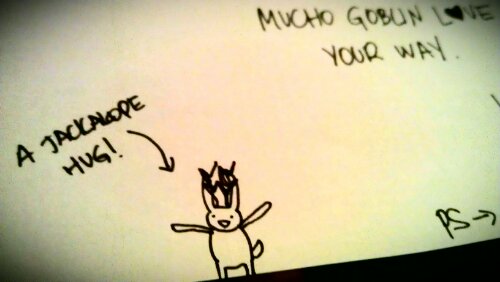My fingertips on your back
Via Cicirella, by the passionately loving Tyler Knott.
The online space of Caroline Bach
Via Cicirella, by the passionately loving Tyler Knott.

As you know, we went for a monitoring and observation visit to Marracuene district yesterday.
It was a great experience and I met some very interesting people as usually when visiting the field. We went around to different health posts in the district, making sure that the children were receiving the adequate dosage of vitamin A, polio vaccine and deworming tablets, checking the expiry dates on the vaccines, and seeing to that everything was in order. I took some time to walk around and speak to parents, health workers and children, which was very rewarding.
One case that struck me was that of a blind man that came to the health post with his two daughters, they had brought him there because they had heard (from the man with the megaphone, remember?) that it was important to get the vaccine. Every time I’m out I realize the importance of communication, of keeping the communities, community leaders, parents, teachers, traditional doctors etc. informed and involved. Letting them own the initiatives, activists feeling like they are contributing, young people understanding the importance and doing their best to get the younger one’s along. And this was happening, older children came with their younger siblings because their parents were out working in the fields, some of them out of their own initiative.
There was one thing that made me think though, and it was the omnipresent detail that the parents and health workers would say “open your mouth, it’s candy!” when giving the deworming tablets to the children. They are not sweet at all, but sure, it worked – this time.
Why not focus on educating and creating a positive picture of medicine as something that helps and cures, instead of infringing the trust of and directly disrespect your children?
Anyway, that was just a detail. But do you know what else I found? A small bear.









And of course, I wrote a story about it for the UNICEF website, here it is:
Marracuene, 27 November 2012 – On the second day of the National Health Week in Mozambique, women and children in the district of Marracuene in Maputo province gathered around health centers and mobile health posts. Led by the Ministry of Health, the campaign aims to improve the health of almost four million children by giving them polio vaccines, deworming tablets and vitamin A supplements. At the main health centers, family planning counseling is also available to all people of reproductive age.
“I am confident that we will reach our targets with the children here in Marracuene,” district director Isabel Menetiane proclaimed. “The numbers are already looking great. Yesterday we surpassed our goal of vaccinating four thousand children daily, and we know from experience that people here tend to come during the last days, so I am expecting a very good coverage”.
At the Marracuene health center, the preventive medicine technician, Rosalina Fumo, fills in the health cards and takes a moment to speak to each mother, giving advice and support. Sofia Cuco, 1 year and 10 months old, is hanging in the scale, it shows 9kg.
“Your girl has not gained any weight since September,” Rosalina tells the mother, 19 year old Zahora, while pointing at and explaining the graph in Sofia’s health card. “This is very bad and can be dangerous. At this age, your girl should be growing steadily. You need to change her diet and add some vegetable oil, milk, eggs or peanut butter to her porridge for her to grow healthy and strong”.
Zahora is thankful for the advice. “I am not happy that my girl has not gained weight, I want the best for her and will follow the advice of the health worker. But I am happy and feel more comfortable now when I know how to help her and knowing that she is vaccinated.”
A bit further away in the same district, a man wearing the white t-shirt and yellow cap for the campaign is standing by the mobile health post set up in a market named Guáva. He is holding a megaphone and shouts in Portuguese and the local language Shangana, urging people to bring their children to get their essential immunizations. Mothers and children are already standing in line facing the health workers, and more children are approaching. They have understood that somebody is giving out something good and some of them are looking curiously at the bright red pills containing the Vitamin A drops, they look almost like sweets.
Nationwide, the Ministry of Justice has joined the Health Week initiative, taking the opportunity to inform mothers about the importance of birth registrations. “It is very clever to use the fact that mothers gather in one place as an occasion to mobilize and advise them to register their children.” the chief medical doctor of Maputo province, Dr. Stélio Alfredo Dimande says.
Dr. Dimande is content with how the campaign is going. “This is a great initiative and we are really covering the entire district. The impact is much greater when we mobilize the communities and make sure that people actually participate. Unfortunately, people don’t come to the health centers for routine vaccinations and controls as often as they should, it would be a cheaper solution for the country – but it’s too difficult and expensive for some people to come, so we need to be the one’s reaching out to the communities.”
A visually impaired man approaches the health post with three children holding his hands, two girls and one boy. The girls are his 8 and 5-year-old daughters, Solange and Suza. As the immunization initiative is intended for children up to the age of 5, only one of them is standing in line.
“The girls came to me saying that they heard that there was something important going on in the market and that I had to take them there,” the father proudly explains. “I don’t see very much so they had to lead me here, but I am still here as their guardian to make sure that my Suza gets her protection and I will make sure that the boy’s parents also come here later with his health card. I am very happy that we found out about this campaign.”
Spent the day in Marracuene district today to do some monitoring of the National Health Week initiative here in Mozambique. Will share a couple of photos tomorrow but until then, here’s a short video. The man with the megaphone was shouting out information in both Portuguese and the local language Shangana, urging parents to bring their children to the mobile health post in the market for their essential vaccines.
In the end, however, as we all know – what draws most attention and interest is music.
The Mozambican Health Ministry has launched a nationwide “Health Week” starting on Monday the 26 November. During the week, all involved partners will cooperate to offer interventions aiming to improve the health of more than four million children under the age of five, and almost a million of women of reproductive age.
In all of the country, all children up to the age of five will be vaccinated against polio, children aged from six to 59 months will receive essential Vitamin A supplements, and children that are more than one year old will be dewormed.
Information campaigning and social mobilization has been carried out over the past 30 days to inform parents and other care givers such as teachers, community leaders, the private sector, political parties and religious leaders, of the need to ensure that all children receive the polio vaccination and the vitamin A supplement, which are essential for strengthening the immune system of children, protecting them against disease.
Additionally, all people of reproductive age are invited to attend counseling sessions on family planning where they will receive contraceptives of their choice during the entire week.
The initiative will take place in all health units in the country and mobile health brigades will visit villages and communities from 26 to 30 November.
As published on the UNICEF Mozambique website

.
Sudden 6am messsage from Den who currently lives in Costa Rica.
“Hey, what was that joke we said we would remember? The one you told when we couldn’t sleep?”
So, referring to when Den visited me in Barcelona in 2011 and we stayed in bed, babbling all night. At one point, half asleep, we got to telling each other bad jokes..
It was NOT that one. Haha.. so the search continues in the dungeons of memory.
Good morning!
Photos and story from the visit to the Health Center in Changara, Tete province. Published on the UNICEF Mozambique website.
© UNICEF Mozambique/2012/C.Bach

Ladies dressed in colourful traditional capulana fabrics are standing in a long line outside of the main health center in the district of Changara in Tete province in Mozambique. They are accompanied by their children and are today attending the monthly health control where their babies will be weighed, measured and checked for diseases.
Little Debora Inácio is four months old and is being held by her grandmother. The mother stands next to them, explaining why they have come today. “We come here once a month to check that everything is okay with the girl. It is very hot sometimes and we have to wait for a long time, but we are very thankful that the health centre takes care of us and our children,” she says, showing Debora’s health card with charts showing whether the girl has the weight adequate to her age.
Almost 200.000 people live in Changara and this is the only Health Center where a licensed medical doctor and admission facilities can be found. Dr. Fausto Muzila is the young doctor that is taking care of the entire district and supervising nurses and other health professionals. He has some support in his work from medical technicians and 12 smaller health clinics, but not even this main health center has advanced enough facilities to take care of some of the most acute and severe cases.
“We do what we can here in Changara, but when somebody needs a surgery after a car accident or when a mother is delivering a baby and acutely needs a caesarian, we simply cannot help them,” Dr. Muzila explains.
Patients in need of urgent medical attention that require surgery or x-ray are sent to Tete, the capital of the province, 100km away from Changara. “It takes more than one hour to reach Tete so it happens that patients die in transport just because they don’t reach the hospital on time, this is very sad,” Dr. Muzila says.
A bit further away, a team of health workers are showing young mothers how to prepare nutritious food for their children from locally grown ingredients such as corn, peanuts and moringa leaves, a very vitamin-rich plant that also contains magnesium and proteins. The mothers are informed that they only need to feed their babies with breast milk during the first six months, as it contains all nutrients the babies need, contrary to the belief in some of the communities.

Carmita, a 19 year old mother, is watching the presentation with her four month old baby, little Beyonce. “This is my first baby and now I will be able to cook food that is good and healthy for her,” she smiles, letting the girl taste some of the mash that the health workers have prepared.
HIV and AIDS related symptoms and diseases, malaria and diarrhea are the main reasons people come to the health centre. Lately however, after a large distribution of mosquito nets in all the communities, the numbers of cases of malaria are less than half of what they used to be.
“The mosquito nets have made a huge difference in the communities,” Dr. Fausto explains. “Now I only work 24 hours a day,” he jokes, smiling and pointing out that he has dedicated his entire life to working at the health center. “I don’t have my own family, I wouldn’t have time. Besides, the patients, the work I am doing here, it is all very rewarding. The health center is my home and family”.









Being part of the jury at the Sunday children’s show at TV Mozambique qualifies to the list of very random things I’ve experienced. It was hilariously fun. And they even made me dance.. on live TV! haha






“This boy is a thief, they should just let him die.”

We stopped the car when we suddenly saw a young man laying on his back in the middle of the highway. Thick, dark blood running out of the back of his skull, short jerking breaths, eyes flickering back and forth, body crooked into an unnatural position. The heat was unbearable, the sun was stinging.
There was a pickup truck on the side of the road, the men in the back were discussing, hesitating whether to stay or to leave. “He’s a thief, he jumped out! We are going to the police!” the men shouted as the car drove away.
We were left alone with a body we didn’t know anything about. There was a rope tied around the boy’s wrist, he had been tied up like an animal. He was wearing nothing but a pair of jeans shorts. His lips were dry and he had bad wounds all over his body. He looked younger now when we were closer, like a teenager, alive and awake, but not present. What happened here?
“We have to set up the warning triangles from the cars.” “We have to get the boy out of this sun, he is barely breathing.”
We brought umbrellas for shadow, a first aid kit, desinfection fluids. A person in our group was a doctor, the first thing he did was putting gloves on. “Of course.” I thought, running the HIV prevalence numbers in the province through my head while looking at my legs that were covered by small drops of blood. The boy was coughing and the wind was carrying the blood my way. “You have no open wounds there, Caroline. Focus.” I had bought a simcard from a differnt provider as I knew my normal number wouldn’t work out in the field. It was the only phone with reception and I called the only medical doctor in the entire district, I had saved the number in my phone just in case I would need it. The ambulance would be there in 30 minutes, at least. We were very far out in the middle of nowhere.
Curious people from the villages nearby stopped to have a look. The level of proactivity from their side was below zero. “Get two strong branches, we need to move the body.” We took our mosquito nets and secured them between the branches, building a stretcher. A person walked around desinfecting hands. I finally got that blood off my legs. The boy went into a seizure attack.
“Keep that head up, he is choking on his own tongue!” Basic things you learnt in school come back to you as the most obvious things ever. You forget that it’s not clear to everybody that a wounded person might need help breathing and keeping their airwars cleared. That a body and head that clearly has suffered from an impact shouldn’t be moved around too much. What was clear was that this young man had hit his head very hard against the paved road.
The men lifted the boy using the improvised stretcher and took him to the side of the road, into the shadow. The doctor was keeping the head in place as the boy had a seizure again. “This happens when things are starting to go really bad on the inside.” the doctor quietly explained in English. “I am not very hopeful about this one, this is all taking way too long.” The endless wait for the ambulance.
The people with the pickup truck came back. They told us that the boy had stolen some cows. The men had caught him and his three friends when they were on their way to the city to sell the cows, it was 11 cows. They had tied the boys up and were taking them to the police station when this one suddenly jumped out of the car. A man came, it was the boy’s uncle. “His name is Edmo, he is almost 20 years old.”
“Why don’t they just leave him here to die?” somebody in the group said in a local language. “Yeah, he is just a thief.” a person added. Our driver understood enough. “A judge can tell you if he is a thief, and a prison will punish him if it is true! Who are you to decide if a person is to live or not? You are responsible by leaving him here instead of taking him immediately to the health center – you are the one’s who will be judged for murder.” the men kept quiet. The ambulance wasn’t arriving. We shared the water we had with the villagers.
“This thing won’t open, it’s closed.” a man said, fumbling around clumsily with the lock at the back of the pickup truck. “I guess we have to just throw him in from above or something.” he stopped trying and waited for further instructions. I grabbed the rope holding the door closed and untied it, it was a very simple knot. “What do you mean it doesn’t open?!” I was so angry about the lack of proactivity that I was boiling on the inside. The men lifted the man into the back of the car. He sounded as if he wanted to scream out in pain but didn’t have energy or control enough to do so.
The pickup drove off. A dying boy, ten clueless men and an uncle. 45 minutes after the accident. We urgently needed to leave in the opposite direction.
“Are you sure they are taking him to the health centre now?” I was in doubt. “Yes, they are many and the uncle is there,” the driver answered. “If there were only four of them it could have been dangerous”.
–
The doctor called us later in the evening. The boy had made it to the health center but needed to be transported to the nearest city 100km away, as the local health centers don’t have enough capacity to take care of such serious cases. He died on the way there. Because he stole a cow. Because people chose not to save him. Because there was no ambulance close enough. Because this is Mozambique, one of the world’s poorest countries.

When you take time answering text messages and then a photo of yourself in the bathroom mirror – just to realize that your colleague has been waiting outside all the time since you met her by the door and she went: “Oh, you go – I can use the toilet downstairs, I’m going home anyway.”
Sorry dude, that was my only 5 minute break today.

I’m not a huge fan of Murakami and the japanese litterature I have come across, I find the stories too similar and don’t identify enough with the supernatural parts in them – they are pretty, but not engaging. Kobo Abe’s Woman in the Dunes is a wonderfully amazing exception though, also packed with subliminal cultural codes, loneliness, banal simplicity and a touch of surrealism – but brilliantly so.
Comic from always funny Wulff & Morgenthaler.

Leaving a beautiful little wooden box and a letter emphasising I will see you very soon, the Cicirella, goblin, frogdog, jackalope sister announced her departure from the building and is now on her way to cold and distant Nordic lands. I’m very happy that she came, we had a wonderful time and I will miss her mucho mucho mucho.